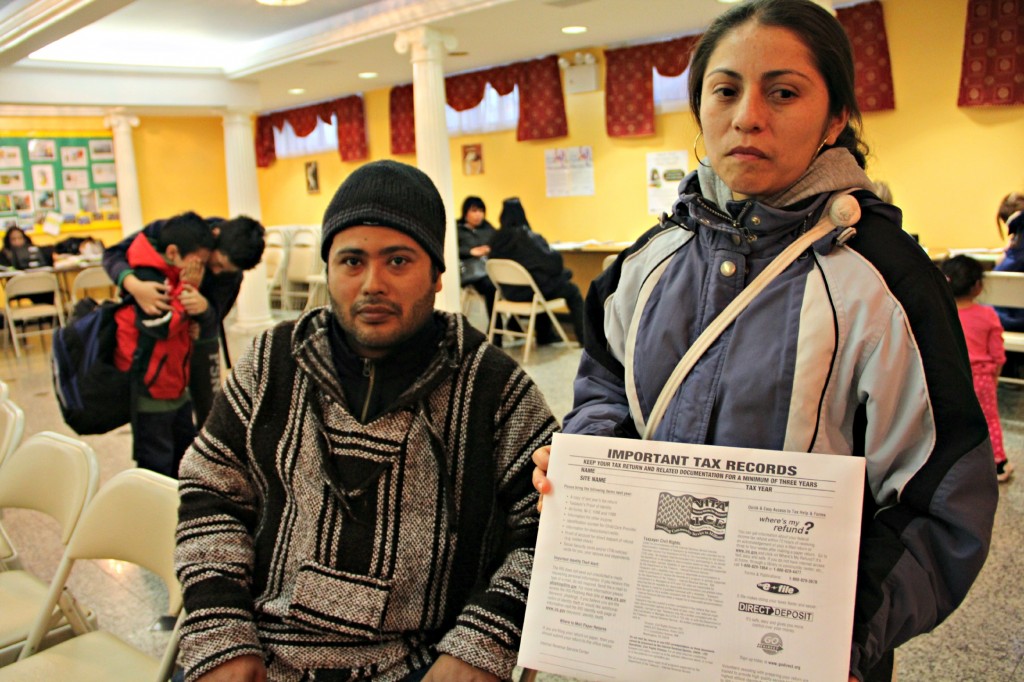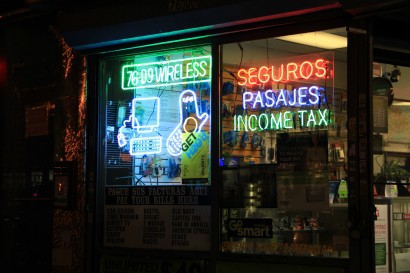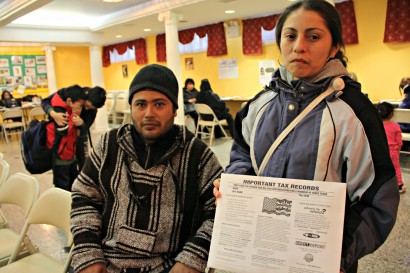Cecilia Huerta, an undocumented immigrant from Mexico, sells coquitos, a sweet coconut snack, from a cart in the Bronx. She says she can make $20 to $40 dollars a day, meaning if she works six days a week, every week, she earns around $9000 a year.
While her annual income is below the $11,490 federal poverty line, Huerta is still required to pay taxes. And like many undocumented workers, she pays them. In fact, she has to pay federal, state and city income taxes out of pocket, as well as self-employment tax. But because she is in the U.S. without legal papers Huerta doesn’t qualify for the Earned Income Tax Credit, a program devised to help the working poor.
Undocumented immigrants don’t have the right to work in the United States, but according to the IRS, anyone working here is required to pay taxes. Huerta arrived in the U.S. twenty years ago, and has been paying into the system for the last ten years, explaining in Spanish that, “It’s something we have to do, so to keep with the laws, we do it.”
Using an individual taxpayer identification number (ITIN ) Huerta has been paying about $200 a year in income taxes – more than she makes in an average week.
Many immigrants, like Huerta, are already active taxpayers. According to a report by the Immigration Policy Center, in the 2010 tax year, undocumented immigrants paid $11 billion dollars in combined taxes, $1.2 billion of which was from personal income tax. According to IRS data from 2006–2011, they issued about 1.5 million new ITINs a year. An undocumented immigrant who’s already paid years of taxes will be a step ahead.
Still, not all undocumented immigrant pays taxes. Often, the people least likely to have paid taxes are low-wage cash earners, with finances similar to Huerta’s, who are required to meet a higher self-employment tax burden. They’re also the ones most likely to be priced out of the requirements for legalization under a new comprehensive immigration reform law.
As immigration reform advances, both the U.S. Senate and President Obama’s proposals include provisions requiring immigrants to pay back taxes before getting on the path to legalization, as well as additional penalties and fees. This ties into the idea of earned citizenship, which, according to Mr. Obama means holding undocumented immigrants responsible for their actions.
Valeria Treves, Executive Director of New Immigrant Community Empowerment, an organization that works with day laborers and domestic workers in Queens, is concerned about the costs that would come with earned legalization. “Unfortunately, even community members have accepted that this is going to be part of the reality,” she said.
Details of the Senate’s plan are yet to be revealed, but the proposal mentioning back taxes already has the immigrant community concerned. Trevez says her organization is fielding questions from immigrants about how much legalization will cost, or how many years of back taxes she thinks will be required. Treves says that people are already starting to prepare for the cost, but adds that there’s, “concern that a lot of people are not going to be able to pull together everything they need in order to enter into legalization.”
Lynn Tramonte, deputy director of America’s Voice, a liberal immigration advocacy organization, says they are very supportive of reform, and that earned citizenship is a centerpiece of that. But she says the success of reform depends on the details, “It comes down to program design elements that can make it so reform will cover all the people that it’s meant to cover,” adding that if it is “too rigid, then it’s not going to work and we’ll be back here in a few years’ time.”
America’s Voice argues that immigrants should pay taxes going forward. She says the idea of paying back taxes has long been part of previous versions of immigration reform. And she cautions that, “a careful examination of the machinations would show that there are a lot of problems associated with recovering those back taxes.”
Tramonte anticipates that getting back taxes from undocumented immigrants would involve digging up hard to document work histories. Immigrants would have to sift through which money belongs to which fraudulently used Social Security number, as well as figure out who might be eligible for earned income, and other, tax credits.
“It would be an administrative nightmare,” says Tramonte, “and likely to cost the government more money than it brings in.”
While pro-immigrant groups are worried about whether the details of reform will leave people out, the Federation for American Immigration Reform is against the bipartisan proposal entirely, and considers earned citizenship to be amnesty by another name. According to their website, any path to citizenship rewards undocumented immigrants who have broken the law to enter the U.S., and will only encourage more illegal immigration.
Oscar and Marcella, a Mexican couple with two young boys, were at a tax prep center filing their taxes for this year. While they were hesitant to get too excited about the possibility of reform, they were already focused on how they can comply with the existing tax laws, and laws that may apply to them should immigration reform pass. The couple are already saving up money in anticipation of any back taxes they may have to pay, and for now, they’re not even entertaining the idea that they won’t be able to afford legalization.
Marcella says in Spanish, that she hopes “the senators legislate a simpler way for us, as immigrants, to become legal. We can’t live like this, illegal forever.”
Huerta says that for her first few years in the U.S. she worked at a textile factory for a dozen hours a day, and where the managers locked the door so none of the workers could get out. She says selling coquitos in the street is much better.
At 62 years old, Cecilia Huerta is close to retirement age, and looks the part. She’s heavy set, grandmotherly and wears a colorful shawl. Her knees ache and standing for long periods of time is difficult, so she carries around a small aluminum-and-cloth folding stool.
When she started paying into the income tax system, Cecilia knew that when she hit 65, she wouldn’t have access to Medicare or Social Security. Her plan or retirement is: “I’ll just keep working until I can’t anymore.”
Fi2W is supported by the David and Katherine Moore Family Foundation and the Ralph E. Odgen Foundation.






